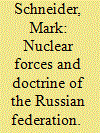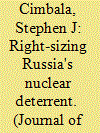| Srl | Item |
| 1 |
ID:
006268


|
|
|
|
|
| Publication |
Boulder, Westview Press, 1995.
|
| Description |
xvi, 318p.
|
| Standard Number |
0813323282
|
|
|
|
|
|
|
|
|
|
|
|
Copies: C:1/I:0,R:0,Q:0
Circulation
| Accession# | Call# | Current Location | Status | Policy | Location |
| 037608 | 355.825119/COC 037608 | Main | On Shelf | General | |
|
|
|
|
| 2 |
ID:
084090


|
|
|
|
|
| Publication |
2008.
|
| Summary/Abstract |
Nuclear weapons and strategic strike capability are the highest priority of the Russian Federation. Russia is deploying both advanced new strategic nuclear delivery vehicles and new types of nuclear weapons. Russian military leaders have openly stated that Russia has deliberately lowered the nuclear use threshold and talk about the use of nuclear weapons in regional and local wars. This is attributed to weakness in conventional forces. However, a number of respected Russian military analysts argue that the real motive is to increase political clout against the United States and NATO. Russia has formally adopted a nuclear escalation doctrine in which the introduction of nuclear weapons into a conventional conflict is characterized as "deescalation" of the conflict. Unlike NATO's "flexible response" doctrine of the 1960s-the nearest parallel to current Russian thinking-there is a dangerous assumption that the use of few nuclear weapons will end a conflict with a Russian victory. Failure to view Russia realistically could endanger U.S. national security in the future.
|
|
|
|
|
|
|
|
|
|
|
|
|
|
|
|
| 3 |
ID:
075044


|
|
|
|
|
| Publication |
Washington, D C, Carnegie Endowment for International Peace, 1995.
|
| Description |
79p.
|
|
|
|
|
|
|
|
|
|
|
|
Copies: C:1/I:0,R:0,Q:0
Circulation
| Accession# | Call# | Current Location | Status | Policy | Location |
| 037242 | 355.8251190947/NUC 037242 | Main | On Shelf | General | |
|
|
|
|
| 4 |
ID:
106456


|
|
|
|
|
| Publication |
2011.
|
| Summary/Abstract |
Russia and the United States face conflicting pressures with respect to broadening and deepening the regime of strategic nuclear arms reductions agreed to in New START. The Obama administration favors additional reductions in long-range nuclear weapons as well as talks on the status of NATO and Russian non-strategic nuclear weapons located in Europe. At the 2010 Lisbon summit NATO and Russia agreed to prompt discussions on the possibility of creating a European missile defense system with shared responsibility. Against these positives, Russia remains wary of U.S. intent with respect to missile defenses, both states face near term presidential elections that distract from prior commitments, and neither the Obama administration nor the U.S. congressional leadership is ready for a bruising post-New START debate.
|
|
|
|
|
|
|
|
|
|
|
|
|
|
|
|